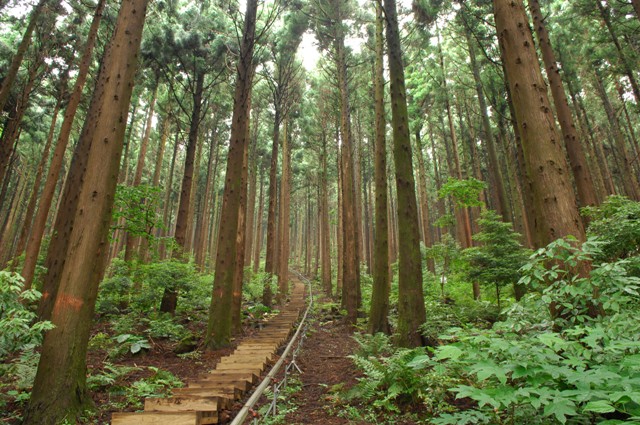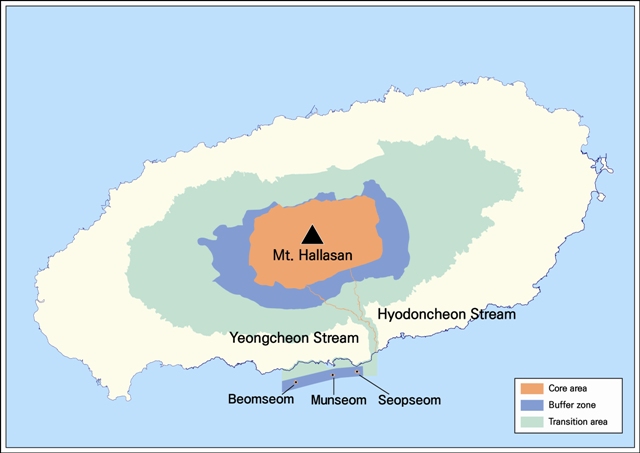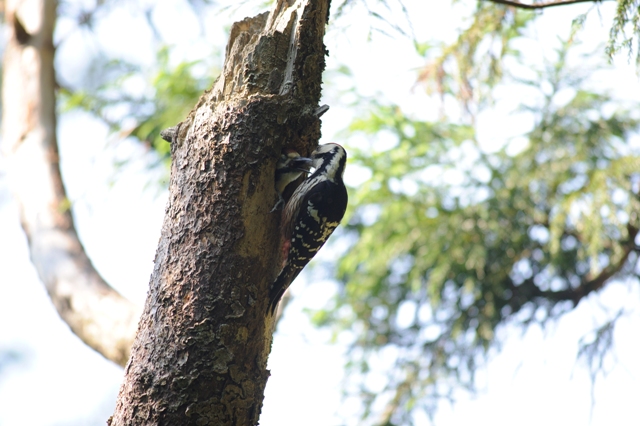|
| |
 |
|
| ▲ Saryeoni Forest, within the Biosphere Reserve, is regulated according to zoning and local laws. Photo Courtesy Temperate Forest Research Institute |
Jeju does things in threes: progenitor gods, plenties, lacks, UNESCO World Natural Heritage sites. It even has three separate UNESCO statuses: Biosphere Reserve and Global Geopark are the others.
The abundance certainly muddies the waters somewhat and since the New7 Wonders debacle such titles attract a certain cynicism from the general public; however, these crowns are not bestowed upon all and sundry. Jeju received Biosphere Reserve status in December 2002 and is one of only four south of the 38th Parallel and another four north of it.
Exactly what are Biosphere Reserves? They are: "areas of terrestrial and coastal ecosystems promoting solutions to reconcile the conservation of biodiversity with its sustainable use." Globally there are 610 of them in 117 countries. (In comparison, there are 188 World Natural Heritage sites over 78 countries.)
For a longer answer we must go back to the UNESCO Biosphere Conference in 1968 and the launch of the Man and the Biosphere (MAB) Programme in 1970. As is clear from the title, the concept central to MAB is sustainable human development in tandem with environmental protection: this contrasts with protecting pristine nature from human influence. UNESCO calls the reserves, “Learning laboratories for sustainable development.”
In keeping with Jeju’s love of the ménage à trois, Biosphere Reserves have three functions, mirroring the interlocking spheres of classic sustainability theory:
Conservation - to contribute to the conservation of landscapes, ecosystems, species and genetic variation;
Development - to foster economic and human development which is socioculturally and ecologically sustainable;
Logistic function - to provide support for research, monitoring, education and information exchange related to local, national and global issues of conservation and development.
| |
 |
|
| ▲ The Biosphere Reserve is divided into Core, Buffer and Transition zones. Image courtesy World Natural Heritage Management Team |
This is broken down within each biosphere reserve to - you guessed it - three zones:
- the core area
- the buffer zone
- the transition area
The core zone on Jeju roughly corresponds to Mt. Halla National Park, surrounded by a buffer zone incorporating much of the forested mountain slopes. The third transition area is the “jungsangan,” mid-mountain areas between 200-600 meters above sea level, excluding areas of urban planning.
There are notable exceptions to this neat zoning, however. The valleys of the Yeongcheon and Hyodoncheon are classified within the core zone snaking all the way down to the estuary on the Seogwipo coast and incorporating the islands of Beomseom, Munseom and Seopseom. The coastal areas thereabouts are also the only maritime regions included within the buffer and transitional zones (see map on map above). These zones necessitate tailored management approaches.
“Within the core area, only research and monitoring are permitted; however, as tourism is long established here it is allowed to continue, although it must not be expanded. In the buffer area, more tourist activity is allowed but this is also regulated,” said leader of the Biosphere Reserve and Global Geopark Team, Ko Kil-Rim.
Jeju’s Biosphere Reserve status is up for assessment and the results will be announced by UNESCO on May 29 of this year. Research was undertaken by UNESCO last year and the decision was made March 21-23. Although it is not a foregone conclusion, “I don’t think there will be any big problems,” said Ko.
In contrast to World Natural Heritage or Geopark Status, Biosphere Reserves are governed under what is known as ‘soft law.’ This has attracted some criticism as there are no ‘hard’ (enforceable) laws to govern their status, instead relying on declarations, local laws and regulations, if any exist. Localities, therefore, have more freedom in governance than under the other titles. The Jeju government, says Ko, is supportive of the World Heritage Team managing the Reserve.
“Although there are no laws protecting the Biosphere Reserve, the localgovernment are aware of the restrictions and they consult with the team on development projects. We also work alongside them; for example, they requested research be carried out on the Yeongcheon which was carried out by Mt. Halla Research Institute,” said Ko “There are also Jeju special laws to protect the environment, such as the restrictions on Jeju stones and soils being removed.”
When Biosphere Reserve status was first received, despite the pride with which Jeju’s UNESCO triple crown is now paraded, there was initial resistance due to fears that development would be blocked on the island. Kang Min-Suk of Jeju’s World Natural Heritage Department doesn’t see continued development as problematic for environmental protection.
| |
 |
|
| ▲ The white-backed woodpecker, one of the rare species found in the Jeju Biosphere Reserve. Photo courtesy World Natural Heritage Management Team. |
“I don’t foresee any threats to Jeju’s status in the near future as Jeju has very tough laws compared to other provinces. New development is tightly controlled,” said Kang.
Man and the Biosphere implies the harmonization of conservation and development and Jeju officials are currently planning to use UNESCO status as a vehicle for sustainable development and to benefit locals.
“We are looking at ways of using UNESCO as a brand for Jeju products. For example, we will be marketing Jeju organic mushrooms under the brand and also increase the development of ecotourism. There are plans to select an ecovillage to develop as a center of ecotourism and sustainable develop-ment. We are in the consultation process now for this,” said Kang.
The aim of these projects is to bring the benefits back to the Jeju people and integrate the economy with the protection of the environment. Kang felt it brought other benefits, too.
“Since being recognized internationally, an international consciousness has been fostered among the Jeju people. We now see Jeju as part of an international community and a place to be protected for all,” said Kang.
The results of UNESCO’s reassessment will be announced on May 29.
|






















